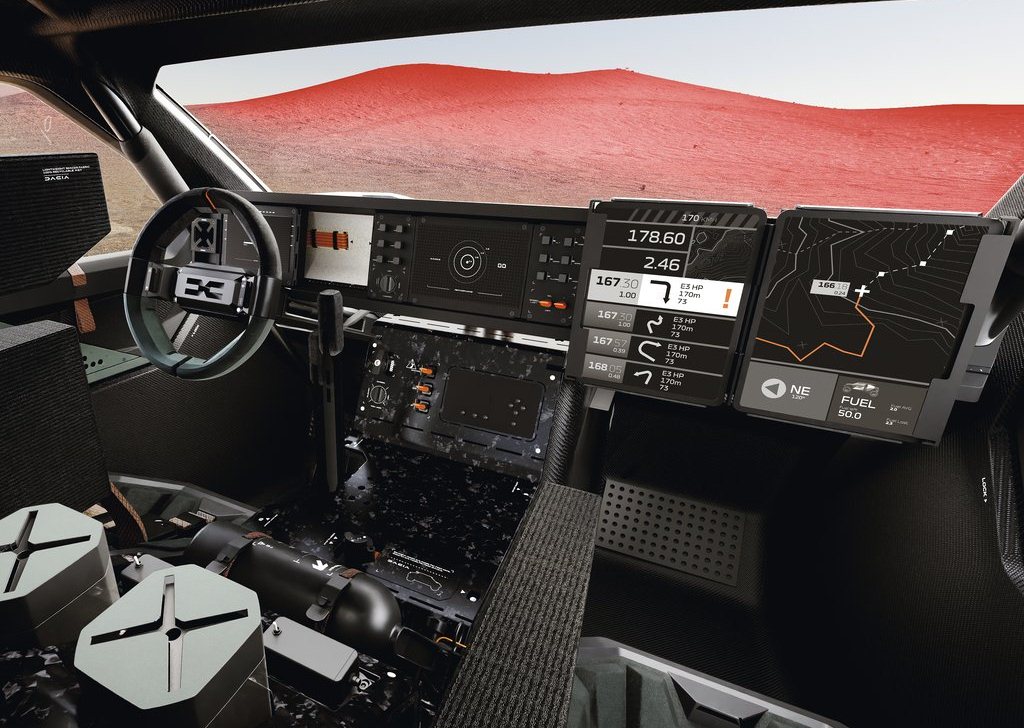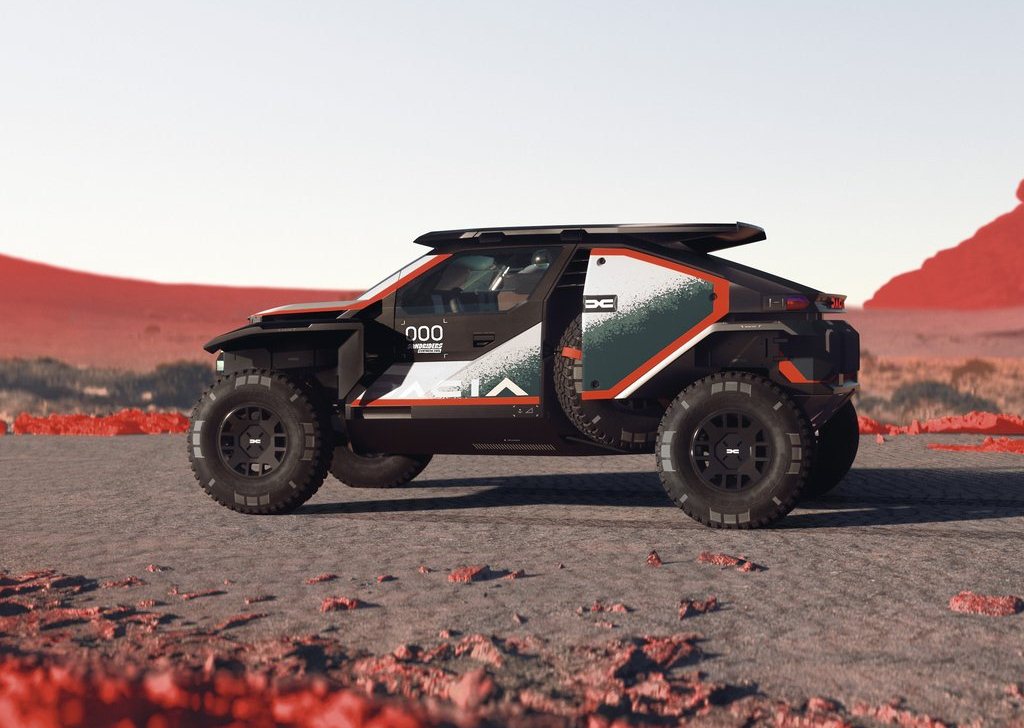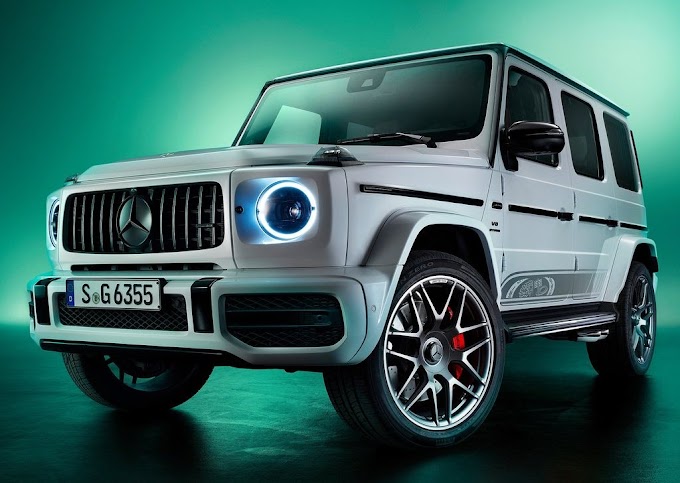Continuing its quest to redefine the essentials, Dacia, the brand with outdoor spirit, is taking part in the Dakar Rally and the World-Rally Raid Championship (W2RC) from 2025. Tackling some of the world's most demanding and harshest terrains, Dacia unveils its contender, the Sandrider, a prototype designed to win.
Inspired by the Manifesto concept car, Dacia's laboratory for new ideas unveiled in 2022, Sandrider is an all-new vehicle designed specifically for rally-raids. It draws on the sporting expertise of Renault Group and Prodrive, a UK company specialising in motorsports.
In keeping with Dacia's famed approach, Sandrider was designed to focus on the essentials of motorsport, that is performance and victory. This innovative prototype cleverly exploits all the possibilities offered by the regulations in the Ultimate T1+ category, focusing primarily on agility and weight. It fully meets the essential needs of both drivers and co-drivers, who were actively involved in its development from the start. From the beginning of the project, and ahead of the many test sessions, the drivers and co-drivers offered their extensive experience and knowledge to both designers and engineers, mainly through hands-on design sessions using virtual reality.
A very special Dacia, but a Dacia nonetheless, Sandrider is strongly aligned with the brand's core values.
STYLISH, ESSENTIAL DESIGN
Styled by Dacia's in-house designers, the no-frills exterior of Sandrider goes straight to the essentials. The vehicle is fitted with body panels only considered as an absolutely necessity. There are no decorative or superfluous parts and naturally, particular emphasis has been placed on aerodynamics.
As part of the brand's approach focusing on the essential needs of both the drivers and co-drivers, the short, floating bonnet features a raked design, disappearing from the crew's field of vision. The anti-reflective paint used on the upper part of the dashboard - a technique borrowed from the aviation industry- also optimises visibility.
For the cabin, Dacia's designers and engineers placed particular emphasis on the needs, habits and constraints of both drivers and co-drivers. Sandrider's modular dashboard lets each crew member adapt the ergonomics and layout of certain features to their own requirements.
ROBUST AND OUTDOOR DESIGN
The Dakar and other rally-raids are some of the world's toughest motorsport events. For this reason, Sandrider required an approach that takes Dacia's robust, outdoor concept to the extreme.
This involved strengthening the vehicle, with a consolidated subframe and bumpers, carbon bodywork, double wishbone suspension and a 4x4 transmission built for the gruelling requirements of rally-raid events. An innovative electrical system maintains optimum power for all on-board accessories, even in the most difficult conditions.
Looking beyond these fundamental design features, Sandrider's robust, outdoor approach also extends to aspects that may seem like details, but actually make life much easier for crews.
For example, the Sabelt seats are upholstered in special anti-bacterial fabrics that self-regulate humidity. The spare wheels are uncovered for easier handling. Similarly, the crew can access onboard tools quickly, without needing to open a box.
Further examples include a magnetic plate, built into the bodywork of Sandrider to prevent the fixation bolts for the wheels getting lost in the sand. This was a tip inspired directly from the experience of the team's drivers and actioned using Dacia's famed good thinking.
Sandrider is equipped with new-generation BF Goodrich tyres delivering optimum grip on all types of terrain, with maximum resistance to knocks and punctures.
AN ECO-SMART APPROACH
Dacia is determined to be the leader in affordable decarbonisation and is fully onboard with the commitment made by the organisers of The Dakar and other rally-raids to make motorsport more sustainable.
Engineers have worked particularly hard to make the car lighter and to reduce fuel consumption. The overall weight of Sandrider has been cut by around 15kg in relation to comparable prototypes. This result was achieved by using a lighter tubular chassis, getting rid of all superfluous body panels and using carbon for the others. Designers also removed all decorative features, and engineers opted for a more compact and lighter engine. To optimise traction and dynamic performance, the weight distribution between front and rear has been significantly increased at the front.
What's more, particular emphasis was placed on aerodynamics to reduce fuel consumption while improving performance. Engineers were able to reduce drag by 10% and lift by 40% in relation to comparable prototypes. As part of their work, they focused particularly on the air inlets that cool the engine.
Heat management is key in the extreme conditions of The Dakar and other rally-raids. To keep the temperature down in the cabin, the designers of Sandrider used anti-infrared pigments directly integrated with the vehicle's carbon body panels. A patent has been filed for this process.
Sandrider's engine runs on synthetic fuel supplied by Aramco. It's a simple, affordable solution for reducing its environmental impact. The synthetic fuels developed by Aramco combine renewable hydrogen with sequestered CO2, providing a lower-carbon fuel that is compatible with today's engines. For Dacia, The Dakar Rally is the ideal testing ground for this technology.
A MOTORSPORT DEBUT SCHEDULED FOR OCTOBER 2024
Sandrider will begin a long series of development tests in several countries. Its motorsport debut will take place at the Rallye du Maroc 2024, the Moroccan leg of the World Rally-Raid Championship (W2RC) between the 5 to 11 October 2024.
The Dacia Sandriders, Dacia's official W2RC team, will compete in their first Dakar and the other legs of the World Rally-Raid Championship in 2025.
The Dacia Sandriders bring together three crews combining experience, talent and enthusiasm.
French rally driver Sébastien Loeb, 49, won the World Rally Championship nine times in a row between 2004 and 2012. He is motorsport's most successful driver and is often regarded as the greatest rally driver of all time. Sébastien Loeb has been taking part in the Dakar since 2016. He will be partnered by co-driver Fabian Lurquin.
Rally driver Cristina Gutierrez Herrero, 32, is a leading name in cross-country rallying. She has already taken part in eight Dakar rallies between 2017 and 2024. Cristina won the World Cup for Cross-Country Rallies, category T3, in 2021. In January 2024, she became the second woman to win in a category (Challenger) of the Dakar, after Jutta Kleinschmidt who came first overall. Cristina's co-driver will be Pablo Moreno Huete.
Nasser Al-Attiyah is a five-time winner of the World Cup for Cross-Country Rallies and two-time winner of the World Rally-Raid Championship. A true Dakar legend, he has won this spectacular event five times.













![2026 Kia Sportage [EU] Review: A Refined European Crossover with Bold Style and Electrified Options](https://blogger.googleusercontent.com/img/b/R29vZ2xl/AVvXsEgqMRwJE1m90uCMgRSB6oc4bAzmAaKXJlNoCwavK5fXHaphLYY1sUVXdxUC94zuj95CdjDG2SqRnUBYMqta-dapTLIaHhzEdJAS821ldVMQOKfAZNpQlZ5fYTwKzKbKj8ad9QeKlaQPcNLRZ6zaGvuXhsg1kQ6zQCQqYtjmOM8q9u-a7Nl3WYjp773OLXJR/w680/2026%20Kia%20Sportage%20%5BEU%5D_01.jpg)









0 Comments